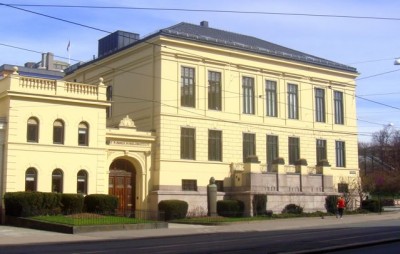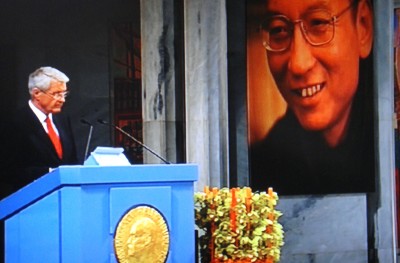NEWS ANALYSIS: Seldom have regularly scheduled changes in the composition of the Norwegian Nobel Committee attracted so much attention, and set off so much political, financial and media intrigue, as they have now. Looming in the background is the thorny issue of Norway’s relations with China, or, more correctly, the lack thereof.

It’s tempting to think that officials at China’s embassy in Oslo, and back home in Beijing, are enjoying all the fuss that’s grabbed headlines in Norway this week. On Friday came more news, that a powerful public relations firm in Oslo was filing a press complaint against newspaper Aftenposten, for implying that it was secretly working to exert more Chinese pressure on Norwegian authorities. Chinese leaders, meanwhile, have continued to let Norwegian politicians and business leaders squirm over how to restore relations, as officials in Beijing continue to blame Norway for an international Nobel embarrassment four years ago.
Chinese leaders are not accustomed to having their authority challenged, as the Norwegian Nobel Committee did when its five members awarded the Nobel Peace Prize in 2010 to Chinese dissident and human rights activist Liu Xiaobo. After nearly four years of fury characterized by stoney silence and sudden outbursts of what some call bullying, there’s little doubt the Chinese want to see the committee reined in, if not punished somehow for its audacity.
Things heated up earlier this month, when Norway’s new Conservatives-led government refused to meet with the Dalai Lama, another Nobel Prize winner who challenges Chinese authority. The government was accused of trying to appease the Chinese, setting off disappointment and criticism both within Norway and abroad.

Now the “China problem” is manifesting itself in the run-up to scheduled changes in the membership of the Nobel Committee, which is appointed by Parliament under the terms of benefactor Alfred Nobel’s will. Ardent defenders of human rights and Norway’s integrity are ready to pounce on any sign that Norway’s government will try to appease China once again. Others claim the committee is overdue for an overhaul regardless of the problem with China, and that more new members should come from outside the realm of politics and even from outside Norway.
That may cause practical problems, but the next chance to make any significant changes to the composition of the committee will come this fall. Since the Conservative Party won more seats in Parliament as a result of last fall’s national election, it will be able to replace the committee seat now held by the Socialist Left party (SV). And since the five-member committee is supposed to reflect the make-up of the Norwegian Parliament (also under the terms of Nobel’s will) it will thus be left with two members appointed by the Conservatives, two members appointed by Labour and one member appointed by the conservative Progress Party, currently part of Norway’s Conservatives-led government coalition.
The Progress Party’s member, former politician Inter-Marie Ytterhorn, is not up for re-election this year. Nor is the Labour Party’s Berit Reiss-Andersen, the head of the Norwegian Bar Association, who was appointed just two years ago in an attempt by Labour itself to draw on people not best known for being former politicians.

Labour’s other member, though, veteran Labour politician and former prime minister Thorbjørn Jagland, is up for re-election, as is the Conservatives’ Kaci Kullmann Five, herself a former politician and government minister. And that’s the source of the sudden intrigue-fueled media frenzy in Norway over their fate.
The Conservatives reportedly want to replace Jagland as chairman of the committee, and since committee members themselves choose their chairman, there will be a three-to-two majority on the committee to do so. The Conservatives, meanwhile, won’t say whether they’ll retain Five on the committee, telling newspaper Aftenposten on Friday that no decisions will be made on the party’s Nobel candidate until this fall.
The head of the Conservatives’ bloc in parliament, Trond Helleland, claimed that any changes are in no way tied to any wish for better relations with China. “We haven’t even discussed that,” Helleland told Aftenposten. “The reality is that discussion often comes up over the committee’s independence (from politics and government). We want to stress that independence, therefore it’s natural to consider other names.”
Media uproar
The “discussion” turned into an uproar last week, when Morten Wetland, a former Labour Party politician and top-level diplomat who recently joined the high-powered public relations firm First House, wrote a column in newspaper Dagens Næringsliv (DN) that called for new international faces on the Nobel Committee and ridiculed the first Peace Prize awarded under Jagland’s chairmanship, to US President Barack Obama in 2009. Wetland, who once worked for Jagland, wrote that it was “the most embarrassing day” during his term as Norway’s ambassador to the UN. No one mentioned the prize, he wrote, and revealed that Obama’s chief of staff yelled at Norway’s ambassador in Washington because the prize was unwanted.
Wetland’s column prompted speculation that he was in the pocket of Chinese interests who want to see Jagland both ridiculed and ousted. Aftenposten printed a commentary by its political editor Harald Stanghelle based on “good but unconfirmed rumours” that Wetland’s motives were tied to Chinese interests. That set off a storm over media ethics and angry denials from First House, long controversial for refusing to reveal its client list. On Friday, First House announced it was filing a formal complaint with PFU, the national press organization charged with handling such matters. Aftenposten defends its column and has obtained some support from journalism professors. Other reaction is decidedly mixed.
Jagland protected, but not as chairman
Labour has since said it will re-elect Jagland for another five years on the Nobel Committee, if he’s still up to the task. Jagland, who also serves as head of the Council of Europe, wouldn’t comment. Five has no such assurances of re-election but told Aftenposten that if the Conservatives want her to continue, she won’t say no. After 11 years on the committee already, though, and given Helleland’s remarks, it now seems likely the Conservatives will take the opportunity to replace her with someone less-political and possibly more international, to improve the image of independence. Not out of deference to the Chinese, of course.
Despite Labour’s and even Aftenposten’s efforts to protect him, Jagland seems destined to lose his chairmanship on the committee, which also is set to get a new powerful secretary and head of the Nobel Institute, to replace the retiring Geir Lundestad.
Intrigue continues
Meanwhile, the speculation over all the maneuvering behind the scenes is likely to continue. Newspapers VG and Aftenposten ran major stories on Friday about how Wetland appeared this week at a meeting of a high-level business, labour and industry committee organized by the Norwegian Shipowners Association (NSA) that has been meeting regularly to discuss the “China problem.” They remain concerned over the diplomatic freeze between China and Norway, and how it will affect their business.
NSA confirmed that it’s a client of Wetland’s First House, raising more questions over the motives for Wetland’s column in DN. China, meanwhile, seems most intent on letting Nobel Laureate Liu Xiaobo languish in prison for daring to challenge their authority, and letting the Norwegians remain in a diplomatic prison of sorts as well.
newsinenglish.no/Nina Berglund

